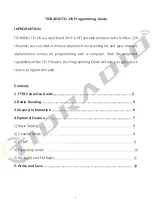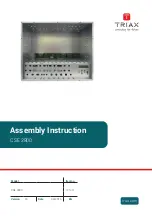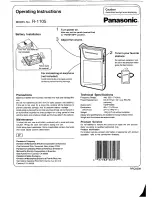
8 92478_UM_ SART_ F
INSTRUCTIONS FOR KEEPING THE RADIO LOG AND THE RADIO OPERATORS
OBLIGATION ACCORDING TO NATIONAL AND INTERNATIONAL REGULATION
.
1. The radio log shall be kept in accordance with requirements in the Radio Regulations, SOLAS
Convention, national regulations regarding radio installations and the STCW Convention (STCW 95
including the STCW Code) including the relevant regulation regarding watch keeping on board
passenger and cargo ships.
2. Unauthorized transmissions and incidents of harmful interference should, if possible, be identified,
recorded in the radio log and brought to the attention of the Administration in compliance with the Radio
Regulations, together with an appropriate extract from the radio log. (STCW Code B-VIII/2 No.32)
TEST OF RADIO EQUIPMENT AND RESERVE SOURCE OF ENERGY
Weekly:
GMDSS handheld VHF transceivers to be tested without using the mandatory required emergency
batteries.
Monthly:
Float-free and manual EPIRBs to be checked using the means provided for testing on the equipment.
Check data for periodical maintenance requirement for float-free EPIRB search and rescue radar
transponders (SART) to be checked against 9 GHz radar.
False alerts transmitted by EPIRB
False alerts are a serious problem for the rescue service. Nearly 90% of EPIRB initiated distress alerts
turn out to be false alarms.
If for any reason, your EPIRB should cause a false alarm, it is most important that you contact the nearest search and
rescue authority and tell them it was a false alarm. They can then stand down any rescue service (coast radio station or
appropriate CES or RCC). Use any means at your disposal to make contact. Switch off the distress alarm by de-
activating your EPIRB, as soon as possible.
Summary of Contents for Tron SART
Page 1: ...92478_UM_ SART_F 1...
Page 24: ...24 92478_UM_ SART_ F...









































